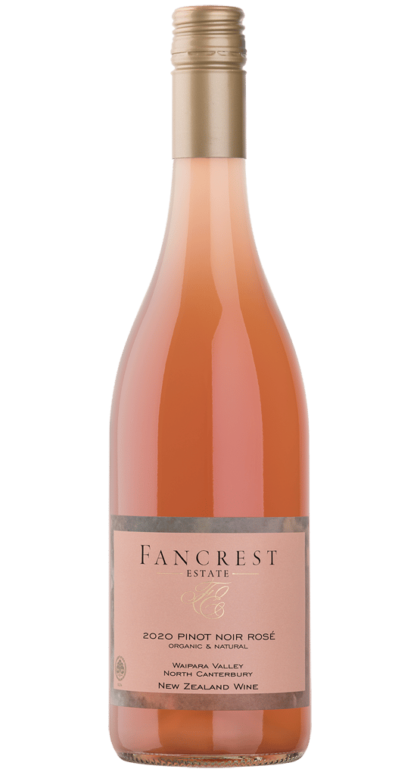
We have chosen BioGro to certify Fancrest Estate as ‘Organic’ so that when you buy our Pinot Noir, you are guaranteed that the highest organic standards have been met every step of the way, both in the vineyard and in the winery.
The BioGro logo on our wine guarantees that it has been produced without the routine use of synthetic pesticides or fertilizers, or genetically modified ingredients, and that it has had a reduced effect on the environment.
Organic Certification
Every year BioGro audits us and verifies that we have met our organic standards. If we make the grade we are authorised to use the BioGro logo which is trusted the world over.
Unusually, we certify both our vineyard and our winemaking, so our Pinot Noir truly deserves to be called “Organic Wine”.
In an article called, “Does Organic Wine Taste Better? An Analysis of Experts’ Ratings,” published in the Journal of Wine Economics in 2016, researchers studied the wine ratings of the most prominent wine magazines. What they found was surprising. Organic wines scored significantly higher than conventional wines.
We believe that organic farming practices are indeed better for grapes. By not using chemicals, the grapes are easier to work with, and the terroir comes through more powerfully in the wine.
Wine is one of the most civilized things in the world and one of the most natural things of the world that has been brought to the greatest perfection, and it offers a greater range for enjoyment and appreciation than, possibly, any other purely sensory thing.
Ernest Hemingway Tweet
So why are organic wines tastier? You need to care more about your vine, you need to protect it from mildews, you need to harvest at a specific time. You justneed to be paying more attention to detail. Also, organic grapes tend to have lower yields, which gives you a better grape with more concentrated flavour which is a huge component of perceived quality.
What is organic wine and is organic wine better for you?
Organic wines are continuing to grow in popularity as we learn more about the benefits of consuming organic food and drink and we are willing to pay a bit more for it.
The global pandemic brought with it a surge in the sales of organic wines. This is possibly to be expected in the time of a global pandemic, with many people looking more for transparency, authenticity, health assurances and of course quality. The associated shift to online shopping and more local shopping from independent stores has also influenced increased sales of organic wine.
Increased demand for organic wines, which are perceived as healthier for us, seems set to continue beyond the immediate impact of the pandemic.

What is the difference between organic and normal wine?
At its most basic, organic wine is made from grapes grown without synthetic chemicals. Grapes grown organically also tend to be smaller than conventionally grown grapes, so organic wine yields are usually comparatively small. Without question this impacts price – but the quality of the fruit is much higher, and a higher quality grape is going to make a higher quality wine.
Organic wine made from organically grown grapes
The organic wine movement started with a focus on winegrowing, with the basic requirement that the wine grapes must be grown without the use of artificial fertilisers, chemical herbicides, synthetic insecticides, pesticides or fungicides and genetically modified products.
Organic viticulture – it’s all about the soil, soil microbes and insects!
Organic farming requires farmers to, above all else, protect and nurture the soil and what lives within it – to encourage biodiversity and promote life.
Essentially, by farming organically, the farmer allows nature to regenerate fertile soil naturally. The spin-off is healthier plants and grapes. It is microbial and insect life within the soil that helps contribute to the soil’s pore structure and ‘humus’ content and its fertility.
Humus is dark, organic material that forms in soil when plant and animal matter decays, producing valuable nutrients needed by plants to grow.
In conventional farming, when low levels of nutrients exist in the soil, desperate farmers are easily persuaded to add chemical fertilisers, but this upsets the natural balance within the soil and the vineyard, killing insect life and leading to poor soil fertility. Organic farmers need to deploy clever techniques to encourage beneficial insect life in the vineyard, by for example:
growing different plants and crops alongside the vines which not only help improve the soil structure and its ability to retain water and nutrients with the soil, but also help attract predator pests which eat other pests harmful to the vines
removing leaves at the top of the wine to enable more sun and air to reach the fruit, called canopy management (essential in cooler, damp environments)
using natural remedies such as plant and seaweed extracts
Can wine grapes be farmed organically anywhere in the world?
Organic farming methods can be followed anywhere in the world, however, it is way easier to apply successfully in warmer, dryer climates like North Canterbury, New Zealand, where mildew and fungal diseases present less of a challenge.
A key barrier to the ability to farm organically is if a neighbouring farm is following conventional methods and spraying plants with chemicals – this is where it can be a challenge for the smaller vineyard.
Fancrest Eseate sold small shares in its water rights to its neighbours on the proviso that they too farm organically, so we are buffered from contamination on all sides.
Organic winemaking – in the cellar
Organic practices go much further than farming in the vineyard. At Fancrest Estate these practices follow through into the cellar.
There is a distinct difference between wines labelled ‘wine made from organically grown grapes’, and fully ‘organic wine’.
In 2012, the EU passed a law for organic ‘winemaking’, dictating standards that ban certain treatments (such as decreasing the level of alcohol), ensure additives such as yeast and egg-white are of organic nature and limit the amount of sulphur dioxide or sulphites used, compared to those in conventional winemaking.
Organic Certification
 Winegrowers like Fancrest Estate need to be ‘certified’ in order to label their wines as organic.
Winegrowers like Fancrest Estate need to be ‘certified’ in order to label their wines as organic.
Many different certifications exist around the world. Usually, specific companies are authorised to issue certificates, control and inspect vineyards for ‘organic’ compliance. In New Zealand the main certifying bodies are BioGro and AssureQuality.
There is considerably higher costs and more work involved in the certification process, and certifying can be a double-edged sword, presenting winegrowers limited options and potentially more commercial risk in a challenging year: there is no option to resort to adding chemicals to supplement the process where nature has struggled and no option to add extra sulphur to ensure the wine is preserved for longer.
For Fancrest Estate, this is all about choice – choice of the as to our priorities and your choice about what you put in your body.
Is organic wine better for you?
The benefits of choosing an organic certified wine are many.
Organic wine tastes better!
It may sound odd to include this as a benefit and everyone’s ‘taste’ in wine is different of course, however if the grapes which form the basis of the wine are farmed totally naturally and are of supreme quality, then it goes without saying the end product is going to taste better. The actual taste is also influenced by the lack of chemicals and additives in the winemaking process.
Organic wine is better for you!
The benefits of ingesting fewer chemicals and man-made toxins are clear to see, with plenty of evidence linked to diseases such as cancer, nervous system conditions and also fertility.
Is organic wine sulphite-free wine and does it still give you a hangover?
Organic wine is also better for those who suffer from allergies and sensitivities and those with conditions such as asthma, due to the lower levels of sulphur dioxide permitted to aid the winemaking process.
Sulphur Dioxide (SO2) is the most widely used and controversial additive in winemaking and is incorporated to kill off unwanted bacteria, yeasts and moulds, and as an antioxidant to prevent oxygen spoiling the wine. Unfortunately an increasing number of people are found to be sensitive to sulphites, or have allergic reactions to it, including headaches, wheeziness, and therefore prefer (understandably) to avoid it.
Organic wine may indeed reduce the impact of a hangover – but the best approach is probably to avoid drinking too much!!!
Organic wines have lower levels of sulphites, but if you wish to minimise further then look for a wine specifically marked ‘low/no sulphur’. The permitted maximum for organic red wine is 100mg/litre as opposed to 150mg/litre for conventionally made red wines, whilst for organic white it’s no more than 150mg/litre (compared to 200mg/litre for conventional wines).
Is organic wine vegetarian or vegan?
No, not necessarily – Some animal based products can be used in winemaking to clarify the wine (for example animal gelatine, egg whites or casein (milk based)). If you wish to avoid such products look out for wines that are ‘Natural’ or Vegan friendly, like Fancrest Estate. Natural wine is most often ‘unfined’ or ‘unclarified’ and left to clear naturally – by gravity or helped by the application of a non-animal-based, natural product.
Organic wine is also better for the environment!
By drinking ‘organic’ you are also helping support a cleaner, healthier environment and helping protect the soil and land for generations to come.
Organic farming in conjunction with Regenerative farming, also leads to more carbon returning to the soils, which can directly impact climate change and mitigate the threats of global warming and increase biodiversity and productivity.



